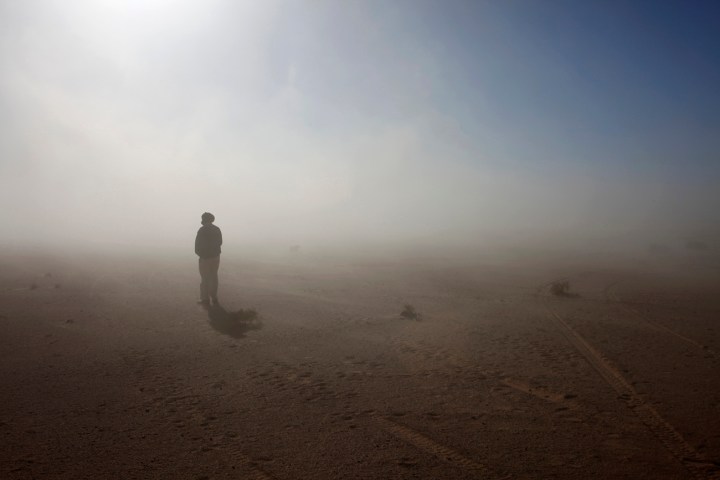Africa
Focus shifts to Sahel as Libyan endgame plays out

Media attention might still be focussed on the hunt for Gaddafi, but in the corridors of power he’s yesterday’s man. Countries are already jostling for position in North Africa’s new geopolitical landscape, which is unusually sandy and filled with terrorists, smugglers and dangerous levels of heavy weaponry. By SIMON ALLISON
In Arabic, the word “Sahel” means coast, or shore. It’s an ironic, perhaps wishful title for the long strip of land which marks the southern end of the Sahara desert, stretching all across Africa from the Red Sea in the east to the Atlantic in the west, where water is hard to find and survival is only for the fittest. It’s a harsh, forbidding environment that every year gets harsher as the Sahara creeps further and further south.
But desertification isn’t the region’s only problem. A major conference called by Algeria this week discussed the Sahel’s two greatest man-made threats, and what to do about them. Billed as an anti-terrorism forum, foreign ministers gathered in Algiers to discuss the growing threat of al-Qaeda in the Islamic Maghreb (AQIM), the al-Qaeda-linked group behind a string of attacks in Sahel countries.
But with Gaddafi’s fall, delegates had something else to talk about. “The repercussion of the Libyan crisis on the Sahel region have become palpable, particularly with the arrival of large amounts of weapons and four-wheel drive vehicles and the return of armed individuals involved in the Libyan crisis,” said Niger’s foreign minister Mohamed Bazoum. Tuesday’s large, high-profile convoy of vehicles into Niger was reportedly one of a few that have made their escape there from Libya. While knowledge of who and what exactly was on the convoys is still unconfirmed, it’s thought that they contained hundreds of pro-Gaddafi soldiers, many of them ethnic Tuaregs, and enough weapons and money for a small army.
The Sahellian countries – specifically Algeria, Chad, Mali, Mauritania and Niger – are understandably worried: they’ve got enough issues to deal with without a sudden influx of armed and dangerous men with nowhere else to go. There’s AQIM, which recently asserted its strength with a vicious attack on a military academy in Algiers, and is rumoured to be expanding its influence by linking with Nigeria’s Islamist group Boko Haram. There’s the prevalence of smugglers, also heavily armed, who see their wilful defiance of borders as a symbol of autonomy and control. Then there’s the institutional corruption which mars the bureacracies of almost all the Sahel countries, which themselves are exceptionally weak and unable to exert much influence on the vast desert area. Their powerlessness is exemplified by Niger’s inability to prevent pro-Gaddafi convoys or even Gaddafi himself from entering the country: “We have no means to close the border…It is too big and we have very, very small means for that.”
The Sahel is certainly big, but, according to Professor Cedric Jourde of the University of Ottowa, a specialist in Sahel politics, this doesn’t mean it’s some kind of desolate no man’s land: “Though the desert is vast, the actual areas used by humans are much more limited. All human activity—whether it is tourism, nomadism, trafficking, or terrorism—relies on the region’s key land routes and converges at water points and fuel stops. That local communities, armed Islamists, smugglers, and other groups involved in illegal activities sometimes interact at these nodes, then, is no surprise.”
The challenge for governments will be to better monitor and police these “nodes”. Algeria, in particular, is pushing for greater control of its border area and surrounds, which it sees as a major source of instability within the country. With the country’s hosting of the anti-terrorism forum and their bullish talk about confronting al-Qaeda in the region, they look to be positioning themselves as the last North African bastion against terrorism; a stance that might just be popular in Washington DC. But they can’t do it on their own, and a serious effort to address the problems posed by AQIM, smuggling and the influx of Libyan fighters into the Sahel region can only be addressed by all the Sahel countries working together.
There is already an institution in place to manage just this kind of regional cooperation. Cen-Sad, the Community of Sahel-Saharan states, was established to facilitate cross-border integration on regional issues. But it’s woefully unsuited to handle the post-Gaddafi world, seeing as it was inspired and established by him, and continues to recognise him as the legitimate leader of Libya. So the Sahel states are going to have to figure out how to solve their problems without the help of their regional body. It’s not going to be easy, given the region’s historic lawlessness, porous boundaries, widespread poverty and lack of respect for authority; but for the region’s governments, its a battle that must be won, or they’ll risk losing that authority completely. DM
Read more:
- Algeria, neighbours searching solutions to Libya war fallout, al-Qaeda in the Washington Post;
- Sifting through the layers of insecurity in the Sahel from the Africa Center for Strategic Studies.
Photo: REUTERS


















 Become an Insider
Become an Insider